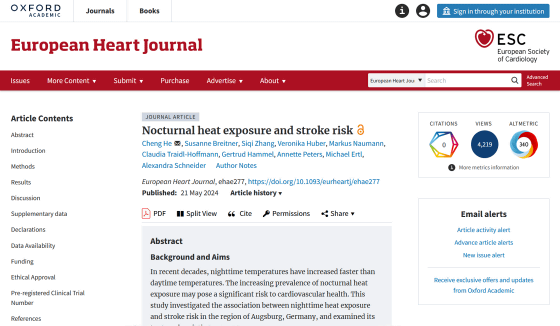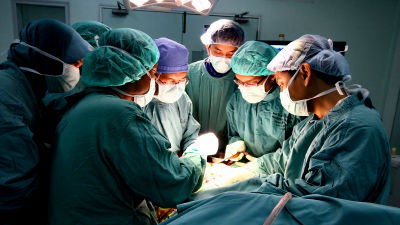'Hot nights' linked to increased risk of stroke

Nighttime temperatures gradually rise from early summer to summer, and it is not uncommon in Japan to experience
Nocturnal heat exposure and stroke risk | European Heart Journal | Oxford Academic
https://academic.oup.com/eurheartj/advance-article/doi/10.1093/eurheartj/ehae277/7676519

Night-time heat significantly increases the risk of stroke - Helmholtz Munich
https://www.helmholtz-munich.de/en/newsroom/news-all/artikel/night-time-heat-significantly-increases-the-risk-of-stroke
Night-time heat significantly increases the risk of stroke | ScienceDaily
https://www.sciencedaily.com/releases/2024/05/240521124617.htm
Hot Nights Linked to Increased Risk of Stroke, Scientists Warn: ScienceAlert
https://www.sciencealert.com/hot-nights-linked-with-increased-risk-of-stroke-scientists-warn
Climate change is expected to lead to an increase in the number of hot, sleepless nights. A research team led by Dr. Alexandra Schneider of the Helmholtz Research Center Munich in Germany investigated the effect of nighttime heat on the risk of stroke.
'We wanted to understand how much of a health risk high night-time temperatures pose, which is important because climate change is causing night-time temperatures to rise much faster than daytime temperatures,' Schneider said.
In this study, the research team used data from Augsburg University Hospital in Augsburg , southwestern Germany. The data included a total of 110,037 stroke cases collected between 2006 and 2020, and analyzed the relationship between nighttime temperature and the risk of stroke by comparing this data with meteorological conditions.

To analyze nighttime heat and stroke risk, the research team defined the hottest 5% of nights throughout the entire period as 'hot nights.' In this data, days with nighttime temperatures above 14.6 degrees Celsius were classified as 'hot nights.'
The analysis found that the risk of stroke increased by about 7% on nights classified as hot nights. They also found that while hot nights were associated with an increase of two stroke cases per year from 2006 to 2012, hot nights were associated with an increase of 33 cases per year from 2013 to 2020. This reflects the rise in nighttime temperatures over the years.
'Hot nights are most detrimental to older people and women, and they increase the risk of developing milder strokes,' said Chen Hu, lead author of the study. 'Our findings highlight the crucial need for urban planning and health system adjustments to mitigate the risks posed by rising nighttime temperatures.'

The research team plans to apply their findings to real-world situations and is working to develop recommendations for stroke prevention and patient care, such as reducing the urban heat island effect and providing extra medical staff on days when high nighttime temperatures are predicted.
Related Posts:
in Science, Posted by log1h_ik







